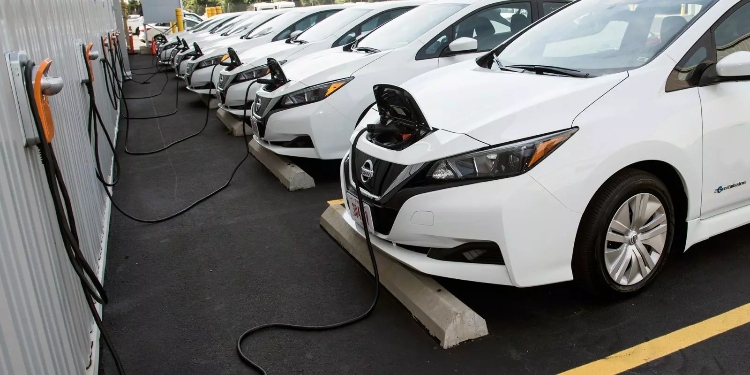As Egypt moves towards using electric vehicles (EVs), it faces both ambitions and challenges that highlight its readiness for this transition.
Ranked 28th in the Global Electric Mobility Readiness Index (GEMRIX) 2023, Egypt has been classified as a “starter market” with a score of 32 out of 100, placing it 10th among 13 countries in the MENA region.
Egypt’s ranking highlights the country’s ambitious and promising EV landscape, marked by government initiatives aimed at fostering a more sustainable transportation sector.
The Egyptian government has demonstrated a strong commitment to promoting EVs as part of its Vision 2030 strategy, which encompasses a ban on traditional petrol and diesel cars by 2040.
The government’s aspiring regulatory framework aims to achieve a 10 percent reduction in greenhouse gas emissions from the energy sector by 2030.
Such goals reflect a broader commitment to sustainability and environmental responsibility.
Moreover, one of the most significant developments on the horizon is the production of Egypt’s first locally assembled electric vehicles.
Such an initiative, in collaboration with Chinese manufacturers, will work towards enhancing local production capabilities and reducing reliance on foreign imports coming from China. The government is currently in talks with two Chinese companies to partner with El Nasr Automotive, with plans to finalize contracts by March 2025.
El Nasr Automotive will be looking to produce the first batch of homegrown EVs, signifying a substantial step toward developing a self-sustaining EV ecosystem.
Financial forecasts suggest that the electric vehicle market in Egypt is poised for growth. By 2030, the market is expected to generate approximately USD 20.08 billion (EGP 1 trillion) in revenue, with an anticipated annual growth rate of 12.03 percent.l
However, the path to widespread EV adoption is filled with challenges.
Upfront costs of electric vehicles significantly exceed those of traditional cars, with many EVs priced above EGP 1 million (USD 19,915).
In contrast, most car sales in Egypt typically fall within the EGP 300,000 (USD 5964.18) to 600,000 (USD 11924.87) range.
Price disparity poses a significant barrier to consumer adoption, especially considering the financial constraints many Egyptians face; the high cost of electric vehicles (EVs) compared to traditional vehicles makes it challenging for a large segment of the population to consider making the switch.
Furthermore, the regulatory landscape remains a significant hurdle. Licensing and registration processes for electric vehicles are troubling and lack a permanent framework. Currently, only a limited number of EVs can gain license plates each month, complicating the ownership experience for potential buyers.
Egypt’s Interior Ministry has been offering temporary license plates and registration for EV owners, yet this is far from a sustainable long-term solution to the immediate need for vehicle identification and legal operation of electric vehicles on the roads.
As Khaled Saad, Secretary General of the Egyptian Association of Automobile Manufacturers, pointed to Enterprise, the lack of a clear framework for assessing duties on imported EVs, which do not have traditional engines, complicates the situation further.
Infrastructure development is another critical aspect of this transition. Egypt’s government plans to invest at least EGP 450 million (USD 8 million) to establish a network of charging stations, with the industry leader Infinity set to install 6,000 charging points across 3,000 stations nationwide.
Presently, there are only a limited number of charging stations, primarily located in suburban areas like New Cairo and Sheikh Zayed, with no stations in downtown Cairo.
To address this gap, industry leader Infinity is set to install 6,000 charging points across 3,000 stations nationwide, aiming to ensure that electric vehicle users have convenient access to charging facilities.
Despite these advancements, consumer awareness remains a significant challenge. Many potential buyers are still unaware of the long-term benefits of electric vehicles, including lower operating costs, reduced maintenance, and the positive environmental impact.
Educational campaigns will be essential in shifting public perception and fostering interest in EV technology.
The COVID-19 pandemic has highlighted the importance of emergency preparedness and adaptability, making it crucial for consumers to understand the advantages of EVs in times of crisis.
In the face of these challenges, the Egyptian government is considering steps to stimulate demand.
Conditional customs exemptions on new and used EV imports are being considered, which could make electric vehicles more financially accessible.
Moreover, the government has pledged to subsidize the costs of the first 100,000 locally produced electric cars, providing up to EGP 50,000 (USD 993.14) in incentives per vehicle, provided they can cover over 400 km on a single charge. Such measures could significantly enhance the attractiveness of EVs for the average consumer.
Ministerial Resolution 255/2018 exempted electric vehicles (EVs) from customs duties and permitted the import of EVs that are no more than three years old. While Egyptian regulations typically prohibit the import of used cars, an exception was granted for EVs to promote their adoption and improve future market prospects for the industry.
In conclusion, while Egypt is taking substantive steps toward becoming a significant player in the electric vehicle market, it faces considerable challenges that require attention.


